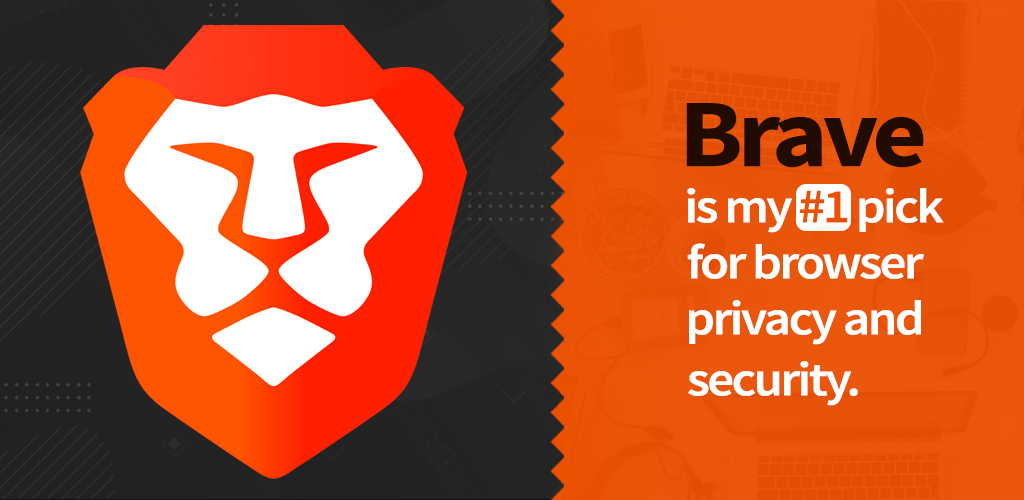Are You Browsing Securely?
Have you ever wondered if your web browser is really secure? This question may seem trivial, but in today’s digital age, it’s one that deserves serious consideration. Every day, we surf the web, oblivious to the potential threats lurking in the shadows of the internet. Cybersecurity is no longer optional; it’s a necessity.

The Importance of Browser Security
In a world where our lives are increasingly online, securing your browser has never been more critical. Your browser is your gateway to the internet, and it’s also a potential entry point for cybercriminals. From phishing scams to data breaches, the threats are real and ever-evolving.
Simply put, a secure browser protects your personal information from these threats. It guards your privacy, ensures safe transactions, and provides a defense against malicious attacks. In essence, it’s your first line of defense in the vast digital landscape.

Brave vs. Firefox: The Showdown Begins
Now, let’s get down to business. We’re here to delve into an exciting comparison between two titans of the browsing world: Brave and Firefox. Both browsers have amassed a loyal following due to their unique features and commitment to user privacy. But the question remains: Which browser offers more security?
This comparison isn’t just about declaring a winner. It’s about providing you with the knowledge to make an informed decision about your online security. So, buckle up, as we embark on this enlightening journey to explore the depths of browser security, compare features, and ultimately determine whether Brave or Firefox earns the title of the most secure browser.
Meet the Titans: Brave and Firefox


Are you ready to meet the titans of our story? In one corner, we have Brave, a relative newcomer to the browser arena but a heavyweight in terms of features and performance. In the other corner stands Firefox, a seasoned veteran who has earned its stripes through years of reliable service.
These aren’t just any ordinary browsers. They are the epitome of innovation and commitment to user privacy. But why Brave and Firefox, you ask?
Popularity Speaks Volumes
One word: Popularity. Both Brave and Firefox are among the top choices when it comes to secure browsing. According to StatCounter, as of August 2023, Firefox holds 8.61% of the global desktop browser market share, while Brave, though holding a smaller share, has been growing steadily, thanks to its unique value proposition.
But popularity alone isn’t the reason we chose these two for our comparison. There’s something else at play here.
A Shared Commitment: User Privacy
Both Brave and Firefox share a common ethos: prioritizing user privacy. In a world where data is the new oil, these browsers have taken a stand, offering users an alternative to the data-hungry practices of some other popular browsers. This shared commitment to privacy is what makes them worthy contenders for our comparison.

The Stage Is Set
Now that you’ve been introduced to our competitors, the stage is set for an epic showdown. Will Brave’s innovative approach to ad-blocking and tracker prevention outshine Firefox’s time-tested reliability and robust security features? Or will Firefox’s experience and wide acceptance give it the edge over Brave’s aggressive privacy-centric model?
The anticipation is palpable, isn’t it? So, let’s not keep you waiting. It’s time to dive deeper into the world of these browsers and discover which one truly reigns supreme in terms of security. Brace yourself, because this is going to be a showdown for the ages!
Firefox Web Browser: The Veteran Browser
Let’s start our exploration with Firefox, the veteran browser. Firefox has been a stalwart in the browsing world for over a decade, earning the trust of millions of users worldwide. It’s not just a browser; it’s a symbol of resilience and commitment to user privacy.
The Security Powerhouse
When it comes to security, Firefox doesn’t pull any punches. It boasts an impressive arsenal of features designed to keep you safe online. According to Firefox Help, these include Enhanced Tracking Protection, DNS over HTTPS protection levels, and HTTPS-Only Mode.
Enhanced Tracking Protection blocks known trackers across websites, making it harder for advertisers and other third parties to track your online activity. DNS over HTTPS offers added privacy by preventing eavesdropping and manipulation of DNS data by using secure HTTPS connections. HTTPS-Only Mode ensures that your connection to all websites is secure, thereby protecting your data from being intercepted.
Privacy at Its Core
Firefox isn’t just about security; it’s also about privacy. As reported by Mozilla, Firefox includes features like Private Browsing, which allows you to keep your browsing history and passwords private. This means that even when you’re using a shared device, your personal information remains just that – personal.
Moreover, Firefox’s Ad Blocker Extensions and Facebook Container enhance your privacy by blocking intrusive ads and keeping Facebook away from your web activity, respectively, as explained on Mozilla’s blog.
User Experiences: The Real Test
But what do users have to say about Firefox’s security? User reviews and experiences can often provide valuable insight into a product’s performance. According to VPNPro, users appreciate Firefox’s clean interface, its range of add-ons including password managers, and its commitment to regular updates. These updates not only introduce new features but also fix any potential security vulnerabilities, further enhancing the browser’s security.
So, there you have it – a look at Firefox’s security and privacy features. It’s clear that Firefox has gone to great lengths to ensure user safety and privacy, making it a top contender in our comparison. But is it enough to outshine Brave?
Brave Web Browser
Allow me to introduce you to Brave, the new kid on the block. Don’t be fooled by its relative newness though. Brave has come onto the scene with a bang, bringing a fresh perspective and innovative solutions to online security and privacy.
Security Features of Brave
Brave means business when it comes to security. According to Brave’s official website, the browser’s security arsenal includes Chromium customizations and client-side encryption for Brave Sync. These features ensure that your data is encrypted before being synced across devices, adding an extra layer of security.
Moreover, Brave’s ‘Shields’, as detailed on their website, offer default, built-in protection. They efficiently block ads, trackers, and fingerprinting, giving you a seamless browsing experience while keeping you safe from unwanted intrusions.
Brave’s Approach to Privacy
Privacy is at the heart of Brave’s mission. In line with GDPR and CCPA policies for data protection, Brave offers features like tracker and ad-blocking, which prevent third-party advertisers from tracking your online activity, as mentioned in FastestVPN’s review.
Brave also proudly supports the InterPlanetary File System (IPFS), a protocol that enables decentralized web browsing, protecting your privacy from potential censorship and control by centralized servers.
User Experiences: The Ultimate Litmus Test
But how does Brave fare in the eyes of its users? According to NordVPN’s blog, users appreciate Brave’s commitment to security and privacy, particularly its ad-blocking feature and the ability to enable HTTPS on websites.
However, it’s not all roses. Some users, as reported by ZDNet, have expressed concerns about certain aspects of Brave, including its cryptocurrency-based rewards system.
So, there you have it – a comprehensive look at Brave’s security and privacy features, as well as user experiences. It’s evident that Brave has made significant strides in prioritizing user privacy and security. But the question remains, Does it have what it takes to outshine Firefox?
Brave and Firefox: Web Browser Security Showdown
Welcome to the main event! In this corner, we have Brave, the new kid on the block with a strong commitment to privacy. And in this corner, we have Firefox, the seasoned veteran known for its robust security features. It’s time for a head-to-head comparison of these two heavyweights.
Security Features: A Side-by-Side Comparison
Let’s start by comparing the security features of both browsers.
Brave’s security suite includes automatic HTTPS connection upgrades, ad and tracker blocking, and client-side encryption for Brave Sync. According to Mozilla, Firefox also offers automatic HTTPS upgrades, but through an extension. Additionally, Firefox features Enhanced Tracking Protection, DNS over HTTPS protection levels, and HTTPS-Only Mode.
Both browsers take tracking and advertisements seriously, offering robust blocking capabilities out of the box. However, as per history-computer.com, while Brave enables these features by default, Firefox allows users the flexibility to customize their settings.
Brave’s Pros and Cons
Brave’s strengths lie in its privacy-first approach. As mentioned on Reddit, Brave comes with ad-block and Lighthouse included, offering a strong browsing experience. Moreover, being built on Chromium, it inherits many of its security features.
However, Brave is not without its flaws. Its cryptocurrency-based rewards system has raised eyebrows among some users, as reported by ZDNet. Additionally, while Brave’s RAM usage is more efficient than Firefox’s, as per Android Authority, its dependence on Chromium could potentially limit its ability to innovate independently.
Firefox’s Pros and Cons
Firefox, on the other hand, excels in offering a range of privacy features like its “Total Cookie Protection” system that helps isolate cookies to the site where they were created, as explained by indubitablyodin.medium.com. Users also appreciate Firefox’s clean interface, range of add-ons, and commitment to regular updates, according to VPNPro.
However, Firefox’s performance may not be as speedy as Brave’s. As per the JetStream2 benchmark mentioned on levelup.gitconnected.com, Brave is 40% faster than Firefox.
Brave: The Champion of Security
Let’s cut to the chase. In this epic battle between two giants of the browsing world, Brave emerges as the victor – a champion that’s redefining the standards of security in the digital realm. But wait! Before we raise the victory flag for Brave, let’s dive deeper into why it has won this showdown.
The Winning Edge: Brave’s Superior Security


Brave, the new kid on the block, has managed to outshine the veteran Firefox with its impressive security features. It’s not just about blocking ads or protecting against trackers, although Brave does those exceptionally well. No, it’s about Brave’s unwavering commitment to user privacy, a commitment that is woven into every aspect of its design.
Remember Brave’s ‘Shields’? Those default, built-in protections that efficiently block ads, trackers, and fingerprinting? They’re not just features; they’re a statement. A statement that says, “Your privacy matters. And we’re going to protect it.”
Furthermore, Brave’s use of Chromium lends it the robustness of Google’s security features, while its client-side encryption for Brave Sync adds an extra layer of security. Impressed yet? We certainly are.
Embracing Internet Freedom with Brave Web Browser
Brave isn’t just a web browser. It’s a tool for internet freedom. Switching to Brave means taking control of your online experience, from how much of your data you share to who gets to show you ads.
Brave also comes with features like Brave Search Engine, Brave VPN, Brave Wallet, Brave Web3, and Crypto, further enhancing the user experience while prioritizing privacy and security.
But don’t just take our word for it. In our article “Experience Internet Freedom: 5 Powerful Reasons to Switch to Brave Web Browser“, we dive deeper into why Brave stands out as a top choice for those concerned with privacy, security, and internet freedom.
The Honorable Contender: Firefox
But let’s not forget Firefox, the seasoned player that has stood the test of time. While it may not have clinched the title in this showdown, Firefox remains a formidable contender with its own set of impressive features. From its Enhanced Tracking Protection to its DNS over HTTPS protection levels, Firefox demonstrates a strong commitment to user security.
Firefox also offers a range of privacy features like the “Total Cookie Protection” system and its user-friendly interface that many users appreciate. So, while Brave may have won this round, Firefox is by no means a losing choice.
The Choice is Yours
Yes, Brave has emerged as the winner in this showdown. But remember, the best browser is not just about superior security features or privacy protections. It’s about finding the one that fits your needs and aligns with your values.
So, while we declare Brave as the champion, we also invite you to explore both browsers. After all, both Brave and Firefox have their strengths and weaknesses, and what works best for one person may not work as well for another.
Are you ready to experience the Brave difference? Or perhaps you’re intrigued by Firefox’s enduring commitment to user security? Either way, it’s time to take action. Try out Brave or Firefox today, and discover a new way of secure, privacy-focused browsing.
Remember, in the digital world, your security is paramount. And choosing a web browser that prioritizes your privacy is the first step towards safer browsing. So, go ahead, choose Brave or Firefox, and browse with confidence!

